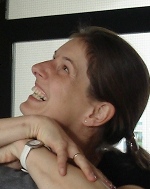|
|
|
Past Sessions > Guests 2022Barbara Hammer Bielefeld University, Bielefeld, Germany https://www.techfak.uni-bielefeld.de/~bhammer/
Research interests
Title Drift detection and explanation Unexpected events or outliers, sensor drift, or individual user behavior might cause changes of an underlying data distribution. This is typically referred to as drift, and challenges of detecting and disentangling drift occur in practice in particular in unsupervised setups and for unknown type and strength of drift. In the talk, based on a formalization of drift in continuous time, we address two challenges: (1) detection / quantification of drift, and (2) explanation of drift. We present a drift detection method based on windowing, which uses an additional filtering step such that stable signals allow the detection of drift from small windows only. In addition, we propose an explanation of drift by means of localization using contrastive methods. For both approaches, we present a couple of experimental results using benchmarks from the literature, and we can accompany both methods by theoretical guarantees. -------------------------------------------------
Davide Bacciu Universita' di Pisa, Pisa, Italy Pervasive AI Lab Coordinator http://pages.di.unipi.it/bacciu/
Davide Bacciu is Associate Professor at the Department of Computer Science, University of Pisa, where he is the founder and head of the Pervasive Artificial Intelligence Laboratory. He holds a Ph.D. in Computer Science and Engineering from the IMT Lucca Institute for Advanced Studies, for which he has been awarded the 2009 E.R. Caianiello prize for the best Italian Ph.D. thesis on neural networks. He has co-authored over 160 research works on (deep) neural networks, generative learning, Bayesian models, learning for graphs, continual learning, and distributed and embedded learning systems. He is the coordinator of two EC-funded project and several national/industrial research projects. He is an IEEE Senior Member, a vice-chair of the IEEE CIS Neural Network Technical Committee, and the chair of the IEEE TF on learning for structured data. He has been serving in the board of the Italian Association for AI since 2015, from 2017 to 2021 he held the position of Secretary of the association and from 2022 he is Vice President. He is Senior Editor of the IEEE Transactions on Neural Networks and Learning Systems. Research interests
Title
Continual learning: a sustainable and scalable way to deep learning
Abstract
Time is a fundamental mediator of effective knowledge and skill acquisition in humans. However, when synthetic agents are allowed uncontrolled lifelong adaptation capabilities, this often results in suboptimal behaviours, such as forgetting of previously learned knowledge. Continual learning targets enabling such lifelong adaptation, allowing the incremental acquisition of new knowledge without incurring in catastrophic forgetting, possibly leveraging positive forward transfer of acquired skills into new abilities. We will discuss the role of continual learning as an enabler for pervasive deep learning models which can be more easily distributed, federated and embedded on edge devices. We will give particular focus to the challenges associated with continual learning for streaming data and on how we can learn from more condensed forms of experience (e.g. learning from streams of trained models).
------------------------------------------------------------------------------
Mykola Pechenizkiy Department of Computer Science, Eindhoven University of Technology (TU/e), Eindhoven, the Netherlands https://www.win.tue.nl/~mpechen/
Research Interests
Title On the Missing Links between Concept Drift Adaptation and Continual Learning |




